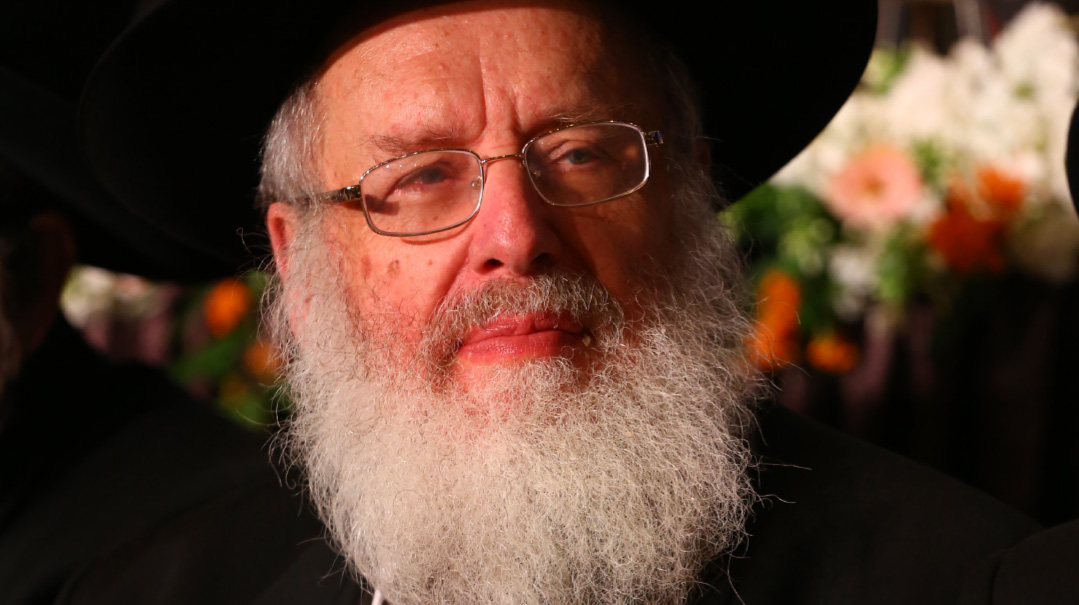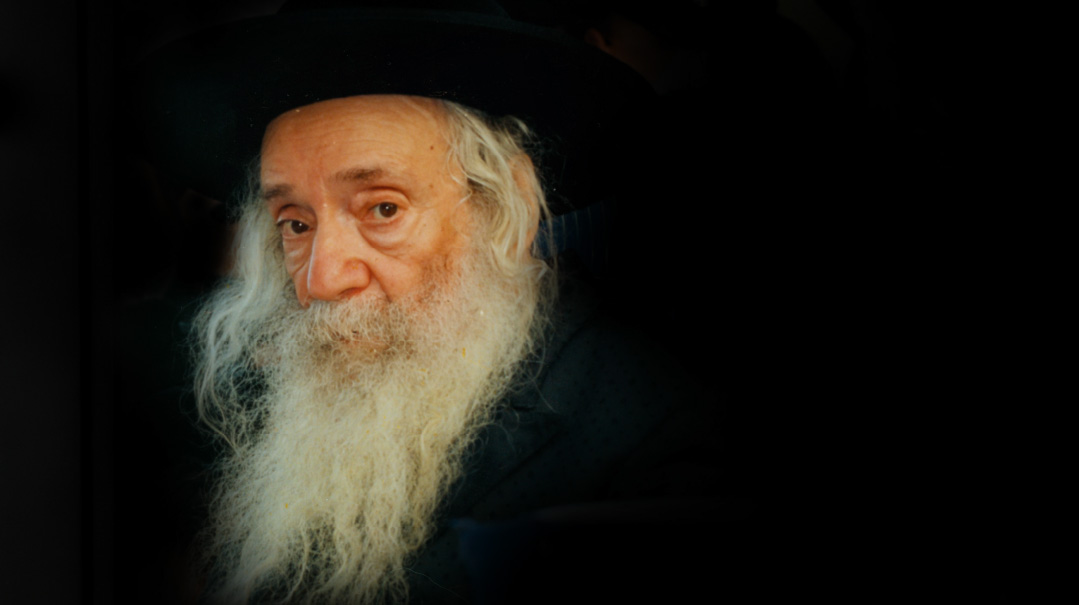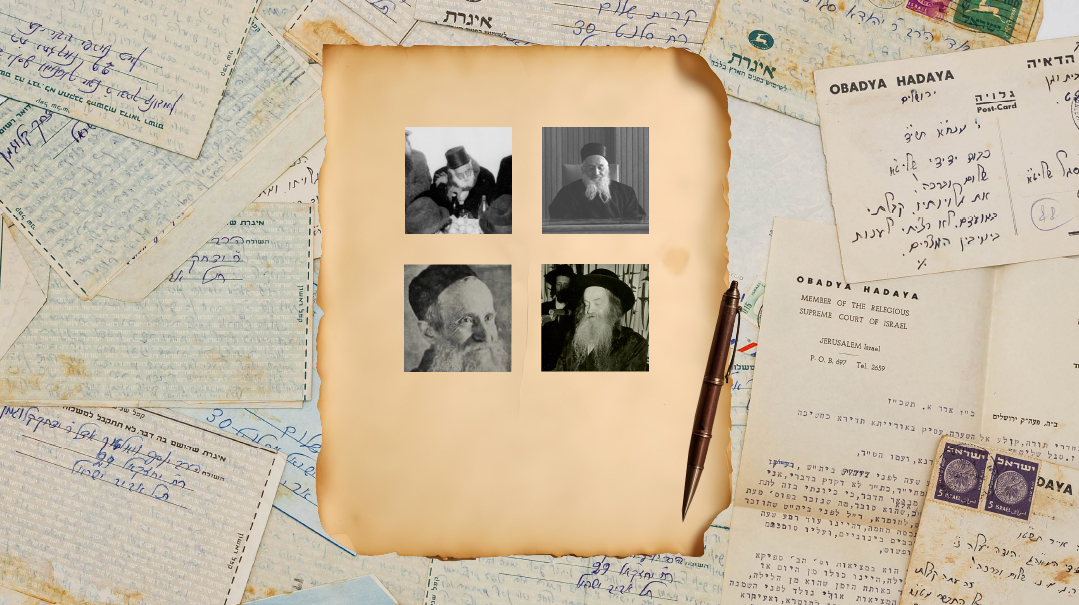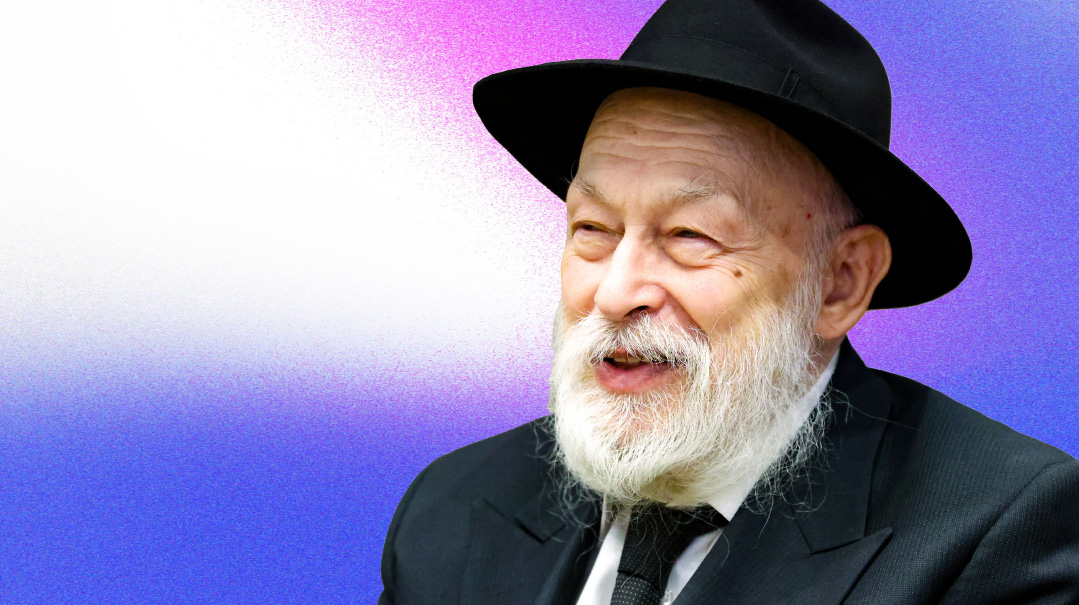Flag Him Down
| December 5, 2023After repeated requests to serve as Shabbos goy, Danny Woodruff started to wonder: Why not make a business out of it?
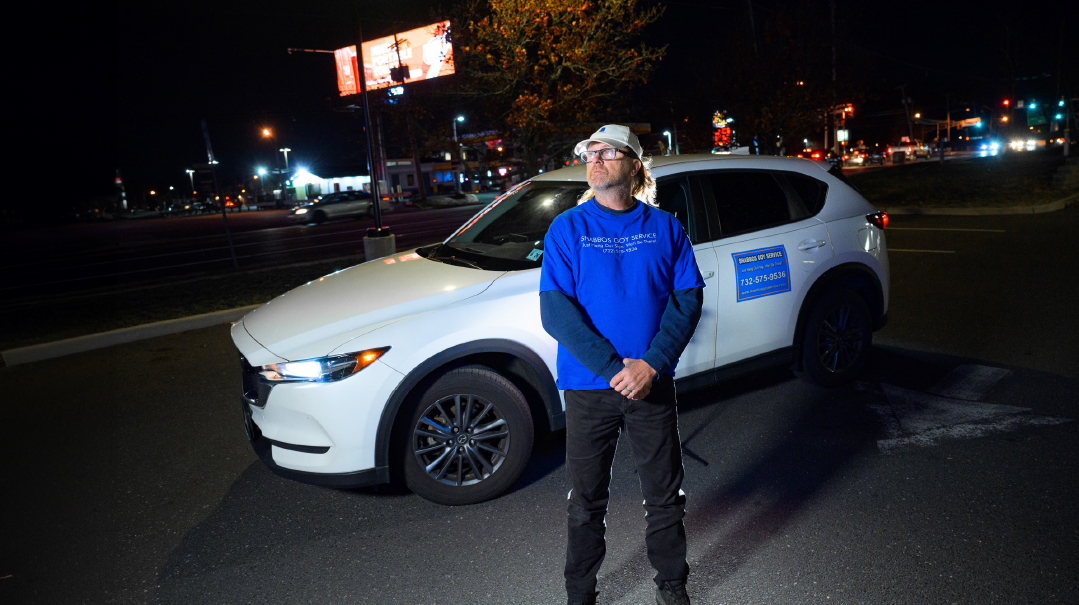
While the bustling batei medrash and packed shuls are still the ir HaTorah’s claim to fame, a quick walk through the streets of Lakewood, New Jersey, today is enough to showcase the entrepreneurial spirit that has come to characterize this frum boomtown. Nearly every week another creative service or innovative product comes to the fore, and it seems like that enterprising intrepidity has now inspired at least one decidedly non-Jewish lifelong resident, Mr. Danny Woodruff, to get a piece of the action. Danny is the proud goy behind the Shabbos Goy Service, a unique service he started along with his wife, ValerieAnn, to assist Orthodox Jews on their day of rest at the drop of a hint.
While the general rule is that a Yid cannot ask a non-Jew to do anything he or she isn’t allowed to do on Shabbos, there are certain exigent circumstances where a non-Jew’s services may be used to perform a melachah on behalf of a Jew. (While the exact halachic details are beyond the scope of this article, the relevant factors are whether the melachah involved is an issur d’Rabbanan or otherwise, and if there is another mitigating factor such as a significant financial loss or other pressing need. Additionally, there are restrictions on how the non-Jew may be asked, and whether one may benefit from the action of a non-Jew that was done on a Jew’s behalf.) Given the limited cases in which one would be allowed to ask for such help in the first place, the time-honored job of “Shabbos goy” was historically relegated to a friendly, non-Jewish neighbor or passerby.
Now, Mr. Woodruff, who works full-time as a maintenance manager in A Country Place — an adult community in Lakewood that has become increasingly popular with frum residents in recent years — has decided to turn it into an actual profession. He ordered a magnet for his car, emblazoned a T-shirt and baseball cap with his trademarked Shabbos Goy Service logo, and ordered some flags for his clients to hang out their front door in case they need his service. Come Shabbos, he makes his rounds — twice Friday night and twice on Shabbos day — to the homes on his route. If he notices a flag out, he’ll stop in and take care of whatever is needed.
The service was launched nine months ago, and he’s admittedly off to a slow start. Yet Mr. Woodruff is working hard to convince residents from across Lakewood to sign up for his unique service. On a rainy evening before Chanukah, Mishpacha magazine caught up with him to hear about his latest venture.
Our Man in Lakewood
A robust 55-year-old with a chiseled face and wisps of long blond hair hitting the collar of his open, Paul Bunyan checkered shirt, Woodruff looks every bit the maintenance man he is. Born and bred right on the border between Jackson and Lakewood, Woodruff watched from afar as the city morphed from a rather small and sleepy town off the Jersey Shore to a bustling Orthodox enclave. “I saw this place go from kinda run down to a nice place after a while,” Danny says in a tough New Jersey accent.
As a teen, the Jackson High student would come to Lake Carasaljo, a sprawling manmade lake smack in the middle of Lakewood, to hang out with his buddies. He remembers some religious people moving into the area. He couldn’t quite figure out what to make of the Orthodox population back then.
Sunday through Friday, they avoided Danny and his ilk. “We’d walk up and down those streets during the week, and Jewish families would see us comin’ down the streets, and they’d start running indoors, going inside,” he remembers. “And we could never figure out why. We’d never done anything wrong.” He shrugs.
Yet come Shabbos, it was as if they had a change of heart. “On Shabbos, they’d be waving at us like we’re good friends, coming over and asking us to do things like turn on the lights, and we’re like — you just ran from us, and now you want to invite us in?”
The wildly divergent behavior was strange all right, but Woodruff didn’t give it too much thought. Continuing right along the All-American dirt road, he graduated high school, tinkered around with some trucks and motorcycles, spent lots of time hanging out, and eventually started his own business cleaning out gutters for folks around town.
“Before these big houses came, I’d clean the gutters on just about every home in Lakewood,” he says. He was in business for a few years, until a frum entrepreneur introduced his own gutter service company, doing everything from installation to cleaning to repair. Woodruff was no competition for the new company with its fleet of shiny trucks, fancy website, and convenient payment plans. “They put me right out of business,” he says matter-of-factly.
With his now defunct business in the gutter itself, in 2012, Danny took over as general manager of a Jewish-owned hotel right near 5th street. He’d do the chores around the facility — getting the rooms in working order, overseeing the hotel staff — and of course, served as a Shabbos goy on occasion for a rabbi who’d trek over from a few blocks away to summon him to do some task in his shul’s kitchen.
His hotel position lasted until Hurricane Sandy thundered into town and destroyed the place. And while Danny’s Jewish employer was able to make an insurance claim on the property, Danny himself was out of a job. His boss connected him with some partners who had properties across the country, and he packed up his belongings and hit the road. He spent the next few years managing hotel properties across the country, in both North and South Dakota, and a few in Texas. (His favorite property was the one that hosted hundreds of motorcyclists as they roared across the US on their Harleys. He wistfully recalls the awesome experience of watching the road and parking lot fill up with tough American bikers.)
His extended road trip lasted for about five years, until he headed back to Jackson sometime in 2017. He did some odd jobs, including power washing, and again those Friday night requests started. “We’d be out working late Friday afternoon, and people would be coming up to us, asking to come to their homes.”
What did they ask? “The usual. The lights, the oven.”
Things really came to a head earlier this year when A Country Place hired Mr. Woodruff as their property manager. His official hours are eight to four, but he recalls one night — “it was Rosh Hashanah or Passover,” he’s not entirely sure which one — when he didn’t get out until 9:30. “Each of the 377 houses needed help — ‘Can you help me? Can you help me?’ ”
After turning off lights in bedrooms and ovens and lowering ACs for the better part of an evening, he found himself wondering, Why don’t I get paid for this?
A Business Is Born
Danny conceived of a proposition where he’d charge people a monthly fee to pass by their homes on Shabbos, and if they needed him, he’d stop in and take care of whatever was needed. He mentioned it to “my friend, who’s a rabbi” — he won’t reveal his name — and the anonymous rabbi was encouraging.
“Danny,” his rabbinic friend told him, “this is the smartest idea you ever came up with!”
Then Danny mentioned it to a Country Place resident, who suggested he get his idea approved by a “Rabbi Forchheimer.” The distinctively Jewish surname rolls off Danny’s tongue with ease, evidencing the numerous times he’s recounted his experience with Rav Yaakov Forchheimer shlita, an outstanding talmid chacham and one of the senior poskim of Beis Medrash Govoha. Danny didn’t know too much about rabbis, but ever the pragmatic one, he looked up the address and headed over to the Forchheimer residence on 6th street.
There was “a guy” standing outside, (presumably a yungerman), recalls Danny. “I asked him where I can find the Rabbi, and he told me he’s in the shool on 7th street.” (That “shool” was Bais Medrash Govoha, located on 7th street, where the Rav learns and answers hundreds of sh’eilos.)
The man walked Danny to the yeshivah and brought him downstairs. In his full maintenance regalia, Danny joined the dozen or so hat-and-jacket-clad yungeleit waiting for their turn to speak to the posek. All those on line and passersby hurrying down the hallway, promptly gave Danny a good, hard look. Talk about feeling out of place.
“I was intimidated as ever — I didn’t think I’d be welcome,” he recalls. “Those Jewish guys looked me up and down until one had the nerve to ask me what I was doing there.” Danny happily explained, and in turn, all the yungeleit on line told Danny he could go ahead of them, as long as he let them listen in on the conversation.
Danny was more than happy to comply — it was free advertising after all — and before long was ushered into the posek’s office. As Danny recalls, “He gave me a big smile.” With the door wide open and eyes and ears steadily trained on him, necks craning from every possible opening to get the best possible view of this most unlikely encounter, Danny explained his new business idea to the Rav.
“He wanted to know what I planned on doing, and we had a back and forth — he made sure that I knew the basics, that I can only take a hint — and then gave me his blessing.” He told Danny to print out a new sign with the words, “Must Have Rabbinical Approval for This Particular Request,” which Danny promptly did. He ran to a friend’s house, printed out a new sign and made it back to yeshivah just in time.
Rabbi Forchheimer took out his pen and wrote directly onto the paper: “This is a good service, provided it’s in accordance with Jewish law,” then signed it.
Danny took the opportunity to ask the Rav for an eitzah as well. “I asked him if he thought it was a good idea, and he said, ‘Well there isn’t one, so you’ll be the first one.’ ” Danny sees inspiration in that blessing, and armed with the rabbi’s encouragement, Danny got to work.
The enterprising spirit may have been a domino effect from the Orthodox population, but his advertisements clearly weren’t. His simple eight-by-ten laminated ad features a clipart house and Calibri font type informing readers that his service is now available in Lakewood, Jackson, and surrounding areas.
“Shabbos Goy Service — We Come to Your House” it reads. “No More Fear of Seeking Out a Stranger to Enter Your Home, We Provide Monthly Shabbos Goy Service from Sundown Friday to Sundown Saturday.” When LNN, a Lakewood news website, posted a video of him talking about his visit with Rabbi Forcheimer, the clip went viral.
Yet as charming as the video was, and as ingenious as his new service is, not too many people rushed to sign up. And the few that did were scattered about — from 5th street in Lakewood to deep into Jackson to the Ocean County Mall area in Toms River, with another on the border of Manchester. In fact, he had to drop some clients before even turning off even one refrigerator light.
His list eventually grew to about 190 families, then shrank after the summer to 38. Now he’s climbing back up — he’s currently at 47. And after a solid few months, he’s no novice Shabbos goy anymore.
The most common request is to turn off a refrigerator light that was inadvertently left on, which isn’t always so simple, he says. Each of the new models, with all their bells and whistles, requires a different method — and his clients can’t even tell him what to do! Danny has most of the refrigerators figured out by now, but he’s still afraid of his rookie Nest encounter.
He also keeps diapers and wipes in his car, after being met with a few desperate requests. And he’s blown away by the cuisine. Nearly every house offers him matzah ball soup, and he says, “the rich guy from Jackson made the absolute greatest steak he’s ever tasted. (When pressed for the winning soup in the area, he admitted it was the rich guy’s wife — apparently, she cooks it in a crockpot and serves it Shabbos day). Koo-gel, too, is offered quite often though he usually declines. “I’m not a big fan of that stuff,” he says.
While he admittedly enjoys the food, Danny says what he really likes is walking into a home, watching the kids jump up and down, and helping people out. Hoping more people take advantage of his service, he makes his elevator pitch why people should enroll and walks us through the steps of becoming a client of Shabbos Goy Service LLC.
“You call us, and my wife answers. We come to meet you. We bring a flag for you, pick a good spot for you to hang it, whatever is most convenient for you. We give you a small piece of Velcro — black ones for black door frames, white for white door frames.”
The 12-inch flag is reflective, and if you need Danny — Crock-Pot is set too high, heat needs adjusting — put up the flag and when he passes your home on Shabbos, he’ll stop in and do the service. (He also removes the flag from the doorpost upon completion of the service and puts it somewhere the kids can’t reach it — usually in the closet, where a second piece of Velcro awaits.) His fee is $25 a month, which includes any Yamim Tovim that month at no extra charge.
The Next Step
Though his current client base has stagnated at just 47 families, Danny has big plans. If he could get an investor on board, he tells me, he would purchase a new vehicle (he likes minivans) that he could utilize to transport expectant mothers to the hospital on Shabbos. Plus, a new stream of cash would allow him to advertise his services more extensively. (Currently, he finds advertisement rates exorbitant and way out of his budget. “$250 for a small business card in the BP?!” Danny asked incredulously.)
His business plan goes something like this: With some serious exposure, his client list will grow by leaps and bounds. The $25 monthly fee adds up quickly, and once people notice the success, calls will start pouring in from Jewish communities across the country, maybe even the world.
Admittedly, even this goy, unrestricted by techum limits, can’t get from, say Lakewood to Linden and then Passaic and Paramus every Shabbos while doing two routes in all of those locales. His plan? (It’s really his wife’s.) To franchise his service out to non-Jewish entrepreneurs in Jewish communities from around the globe. He (and his lucky investor) will earn royalties from the monthly fees collected by the various uniformed Shabbos goyim doing Shabbos routes.
(Though this should not be construed as legal advice, an investor doing his due diligence prior to making a commitment may be concerned that hiring an additional employee for the Shabbos Goy Service is almost asking for a discrimination suit. Obviously, the service would have to be manned exclusively by non-Jews, and a candidate found out to be a Jew would be summarily dismissed. Yet a plaintiff job-candidate alleging this seeming textbook violation of Title VII of the Civil Rights Act of 1991 would likely fail to make a prima facie case as the elements needed to sue include being “qualified for the job,” which a Jew decidedly isn’t.)
For now, Woodruff is focused on growing his Lakewood client base. After all, he says, the population here is growing by leaps and bounds, so much so, that traffic is backed up all the way down his road, making what should be his five-minute commute to work take more than 20 minutes. Yet if his service ever takes off, he’ll be more than grateful, because as bad as traffic gets, Shabbos it’s clear sailing. This Shabbos goy is virtually the only one on Lakewood’s roads, cruising up and down its byways and highways, looking for that flag.
PATH TO PROMINENCE
Danny’s weekend-only occupation has led the otherwise obscure maintenance man to a degree of fame. (A video of him sitting in his garden in his co-op housing community, recounting the story of his first visit to Rabbi Forcheimer, garnered several thousand views after a Lakewood news site posted it.) While it’s fair to assume that the Shabbos goy profession is not necessarily a ticket to prominence, several noteworthy Americans actually can list the gig on their résumés.
Former President Barack Obama’s office in the Illinois legislature was situated next to State Senator Ira Silverstein’s. Then State Senator Obama often offered to assist Senator Silverstein, an Orthodox Jew, with tasks that the latter was unable to perform on Shabbos, such as opening electric doors, as did former Vice President Al Gore for Joe Lieberman, his running mate in the 2000 election.
Mario Cuomo, the late governor of New York and father of the disgraced ex-Governor Andrew Cuomo, used to recall his experience as a Shabbos goy for a synagogue on the same street as the grocery his parents owned. In fact, unlike Mario’s son, whose relationship with the Orthodox community soured during the coronavirus pandemic, Mario Cuomo himself was considered a friend of the Orthodox Jewish community and many credited the relationship to his juvenile experience servicing the synagogue up the block.
Former President Harry S. Truman grew up in Independence, Missouri, and lived next door to an Orthodox family, the Viners. Abe Viner and a young Harry Truman were good friends, and years later, Abe’s sister Sarah recalled Harry coming over to their home on Shabbos and carrying out chores that the Viners were restricted from.
(That Jewish connection may have been Truman’s first, but it certainly wasn’t his last — or most significant. Eddie Jacobson, a Jew originally from New York, was Harry Truman’s closest friend, having served together with him in the US Army before they opened a doomed haberdashery store together.
When Truman succeeded FDR as president of the United States, the Zionists mounted an intense campaign to get Truman to meet with Haim Weizmann, whom they were convinced would be able to persuade the president to recognize the State of Israel. When Truman grew irritated with the incessant pressure, he instructed his staff not to let any more Zionist lobbyists in. Despairing, the Zionists turned to Jacobson to prevail on his old pal. The President couldn’t refuse his friend and ended up meeting with Weizmann.)
Former House Speaker Nancy Pelosi waxed poetic about how she was introduced to the Israeli-American relationship, telling the audience at an AIPAC Conference that her father, former United States Representative Thomas D’Alesandro Jr., was a “Shabbat goy as a teenager,” though she didn’t divulge details regarding who had employed his services.
Eric Trump joked to an Orthodox audience that his older sister, Ivanka, referred to him as the “Shabbos goy,” and while there is no such official record, it’s likely that former US President Donald Trump has, at times, performed a melachah or two on behalf of the First Eidim and family.
Finally, there were two future American icons — one Supreme Court Associate Justice and one Secretary of State — whose erstwhile side hustles gained prominence in their more prestigious careers. Nat Lewin, the renowned constitutional scholar and Supreme Court lawyer, recalled meeting Supreme Court Associate Justice Thurgood Marshall when Lewin worked for Marshall in the Solicitor General’s office. Lewin introduced himself and began listing his resume to his new boss — YU for undergrad, Harvard Law School, law clerk at the Court of Appeals and then for the Supreme Court — and Marshall, who had no doubt heard the drill beforehand, “exhibited faint boredom,” according to Lewin.
Then Lewin brought up his Shabbos observance, saying he would have to miss every Shabbos, as well as Rosh Hashanah followed by Yom Kippur. This excited Marshall. “And then there is Succos, Shemini Atzeres, and Simchas Torah,” Marshall finished off. Stunned, Lewin inquired how the Solicitor General was so well versed in Jewish holidays.
“Easy. I grew up in a Jewish neighborhood in Baltimore. In fact, I made some money by turning off lights in homes there on Friday nights,” Marshall replied.
His early experience affected his (dissenting) opinion in at least one case, which Lewin argued before the Court after his former boss had already been appointed to the bench. In the 1985 case, Goldman v. Weinberger, a Jewish and yarmulke-clad psychologist, Simcha Goldman, had been serving in the US Air Force when his commanding officer informed him that he was in violation of Air Force Regulation 35-10, which prohibits headgear from being worn “while indoors except by armed security police in the performance of their duties.” Goldman promptly sued then-Secretary of Defense Caspar Weinberger (who himself was of Jewish paternal descent) for violating the free exercise clause. The case made its way to the US Supreme Court, where Goldman lost.
Years later, the Library of Congress received the handwritten notes of a Justice Blackmun, a colleague of Marshall. In Blackmun’s notes around the date that the arguments in front of the Court were held, Justice Blackmun noted Marshall’s thoughts about the yarmulke case: “I was raised in Orthodox J neighborhood in Baltimore. Very impt to them.”
(Though Goldman lost his argument on the grounds that the Free Exercise clause did not apply to the military in the same way it did to civilian society, the ruling was superseded when the United States Congress enacted the National Defense Authorization Act of 1988. The Act, among other things, expressly allows service members to wear religious apparel.)
Finally, former Secretary of State Colin Powell — the four-star general who rose through the ranks of the US military and government to become the first African American to hold the country’s top diplomatic position under George W. Bush — grew up in the Bronx, where he would work as a Shabbos goy for some local families. He was employed in a Jewish-owned shoe store; it was there that the future politician picked up a smattering of Yiddish. Once, when visiting Israel, Powell told Prime Minister Yitzchak Shamir that “men ken reden Yiddish.”
When Powell was the United States Chairman of the Joint Chiefs of Staff (the nation’s highest-ranking military officer), he met Israeli Admiral Ben-Shoshan at a reception. Powell greeted Shoshan by asking him, “Vos macht a Yid?” Ben-Shoshan, who had no idea what the general was talking about, turned to the Jewish official who had made the introduction for a translation, but was bested by Powell, who retorted, “Iz doss a Yid?”
(Originally featured in Mishpacha, Issue 989)
Oops! We could not locate your form.


